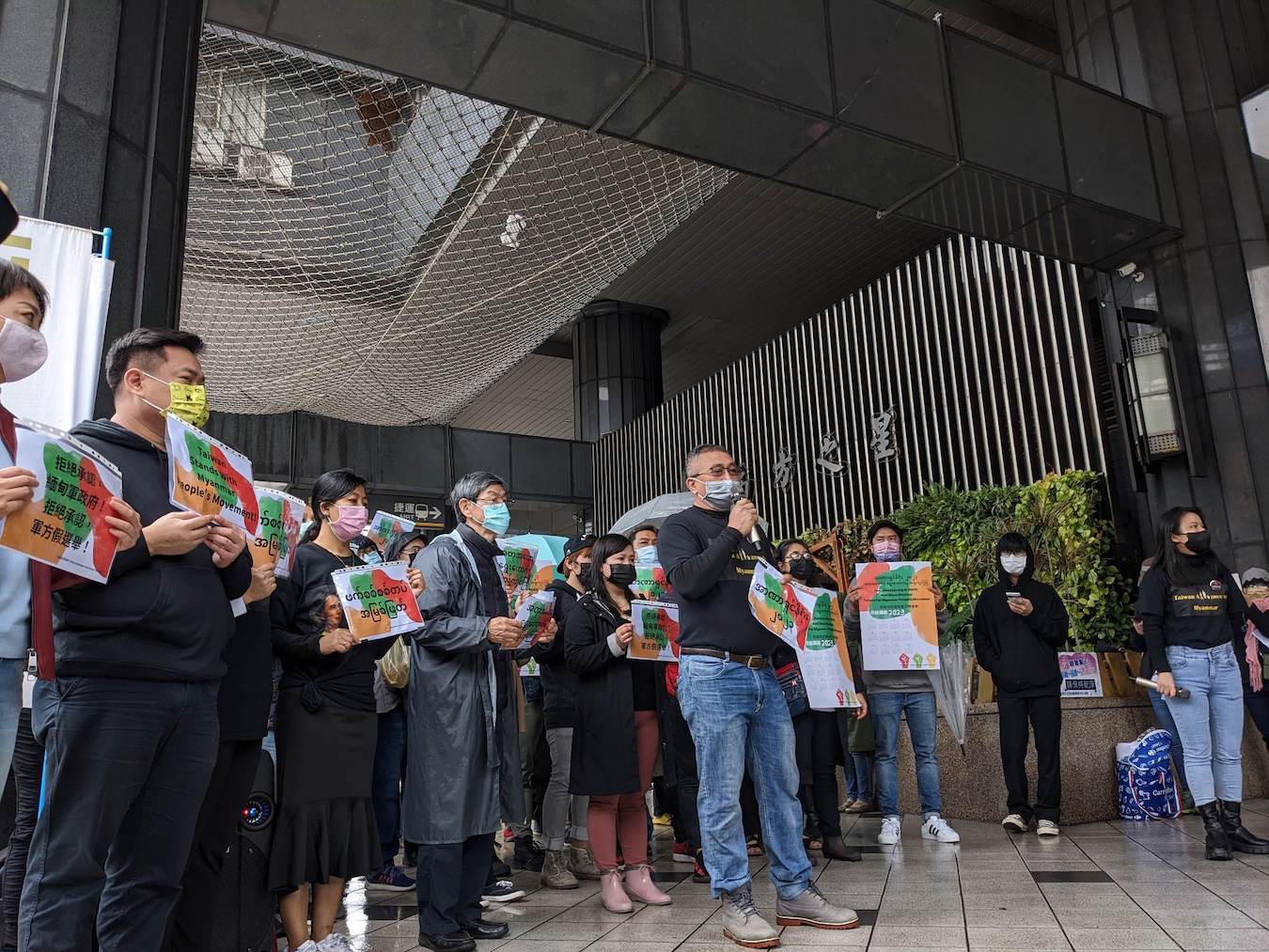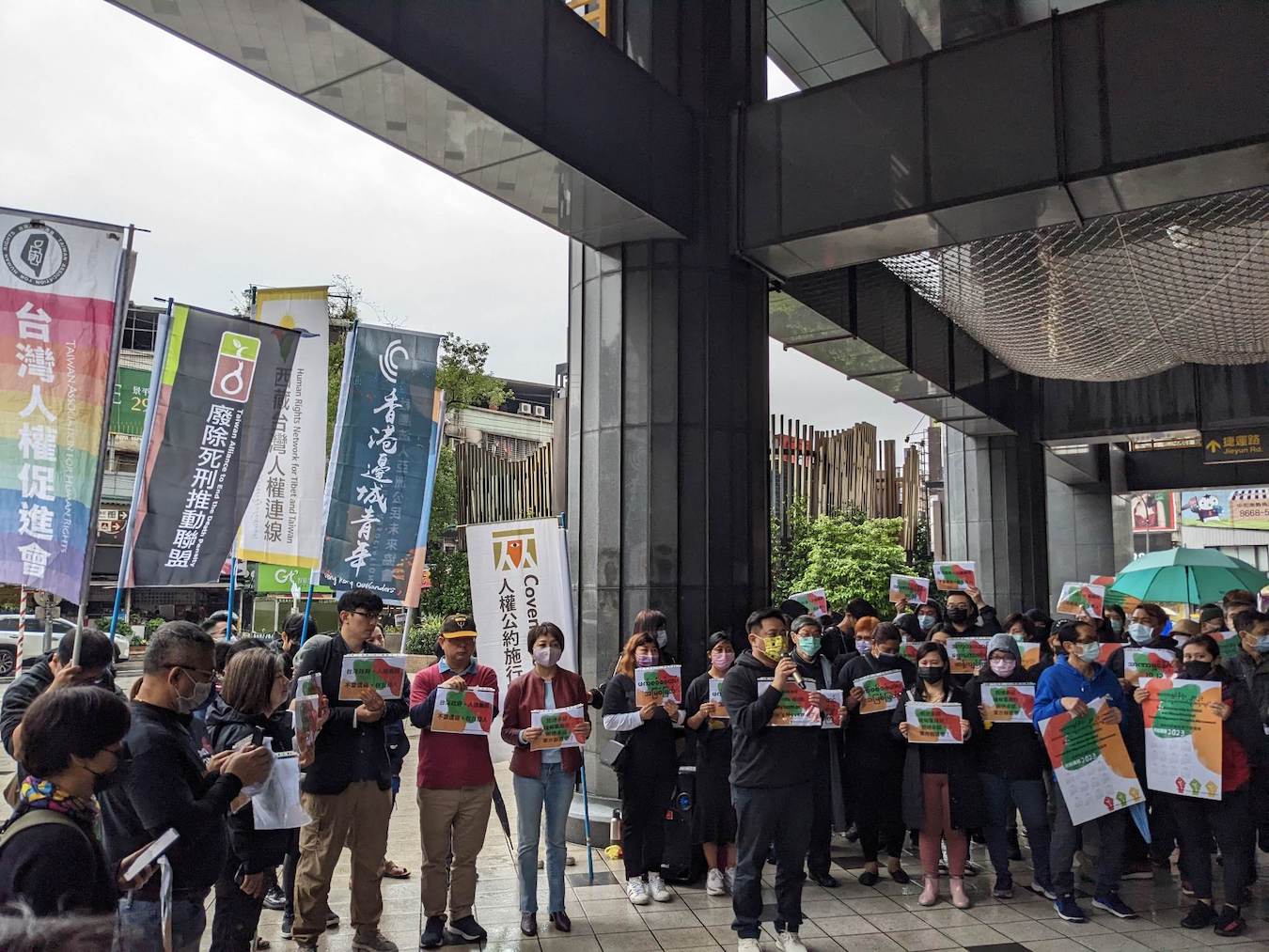by Brian Hioe
語言:
English
Photo Credit: Aurora Chang
TAIWANESE CIVIL SOCIETY groups gathered outside the Nanshijiao MRT station yesterday to mark the second anniversary of the coup in Myanmar. The rally began at 10:30 AM outside Exit 4 of the MRT.
The location was chosen because the area around Nanshijiao is home to many Burmese-Taiwanese, as a result of which the area is sometimes referred to as “Little Burma.” After the coup, many of the rallies held to draw attention to the issue took place in Little Burma, or involved residents of the area, leading to greater awareness of the sizable Burmese-Taiwanese population in Taiwan.
 Photo credit: Aurora Chang
Photo credit: Aurora Chang
Groups that were represented at the event included the Taiwan Alliance for Myanmar, the Clean Clothes Campaign East Asia Coalition, Asia Citizen Future Association, and Hong Kong Outlanders. Likewise, longstanding stalwarts such as the Taiwan Association for Human Rights, Youth Labor Union 95, Taiwan Alliance to End the Death Penalty, Covenants Watch, Human Rights Network for Tibet and Taiwan, the Serve the People Association, the Taiwan Labour Front, and Students for a Free Tibet were also present. These are groups commonly involved in activism to do with political freedoms, whether in Taiwan or elsewhere regionally, particularly regarding issues that have to do with Chinese influence. Indeed, some of these groups played a key role in the 2014 Sunflower Movement.
Otherwise, a number of pan-Green legislators expressed support for the rally. This included DPP legislators Hung Sun-han, Fan Yun, and Lin I-chin, as well as Claire Wang of the NPP. Hung and Fan spoke at the event.
Speakers called attention to the fact that over three million people had been displaced in Myanmar in the wake of the coup, with a civil war having broken out afterward. Likewise, speakers called attention to the military government’s use of indiscriminate killing targeting civilians and young people as part of its campaign of terror, including arrests of college students on politically motivated charges. Speakers, too, highlighted links between Myanmar’s military government with the Chinese and Russian governments.
To this extent, speakers called for greater support for the National Unity Government (NUG), a parallel government set up by former lawmakers mostly from Aung San Suu Kyi’s National League for Democracy party. Speakers highlighted that some areas in Myanmar are substantively controlled by the NUG, something that has raised questions about the validity of treating the military regime as the legitimate representative of Myanmar abroad.
In particular, the speaker from Youth Labor 95 brought up firings conducted by Pou Chen, a Taiwanese garment company that owns a factory in Myanmar. The firings are thought to have targeted workers involved in organizing a labor strike in late October that involved 2,000 workers. Workers were calling for an increase of their minimum wage from 4,800 kyat (US$2.27) to 8,000 kyat ($3.78).
 Photo credit: Aurora Chang
Photo credit: Aurora Chang
Pou Chen’s management responded by calling in soldiers from the military regime. Pou Chen’s factory in Myanmar has around 7,800 workers and is a supplier for Adidas. Pou Chen’s actions raise questions about when Taiwanese companies violate labor practices or conduct other human rights violations, drawing up links with authoritarian governments to crack down on labor organizers or other activists–as can also be observed with Taiwanese companies in China that rely on state backing, and in countries in Southeast Asia where Taiwanese companies maintain factories, such as in Vietnam with regards to 2016 mass fish die-offs caused by Taiwanese-owned Formosa Plastics. The Vietnamese government cracked down on demonstrators against the fish die-offs in defense of Formosa Plastics’ investment in Vietnam.
Toward the Taiwanese government, the rally called for greater assistance for asylum seekers from Myanmar. Taiwan currently lacks any asylum or refugee laws, something that civil society groups have long criticized as a shortcoming. Many Burmese residents of Taiwan still lack basic rights regarding housing, employment, insurance, or education, an issue that affects not only Burmese but members of other groups that have fled to Taiwan because of the deteriorating human rights situation in their home country, as with Hong Kong.
It is to be seen, then, if there will be further calls for action regarding developments in Myanmar. The civil war still rages on in Myanmar with no clear end in sight, but two years on, there may still be lacking awareness of this in Taiwan.

